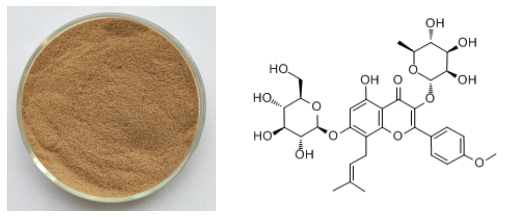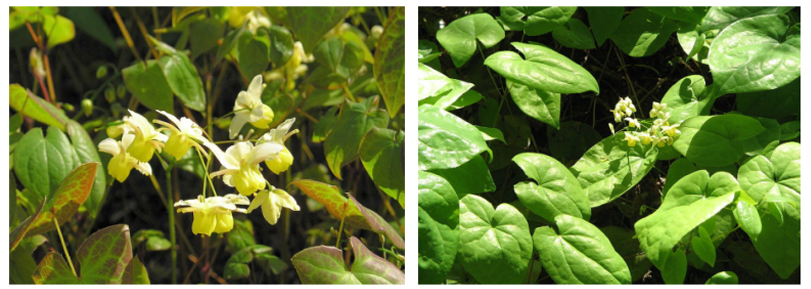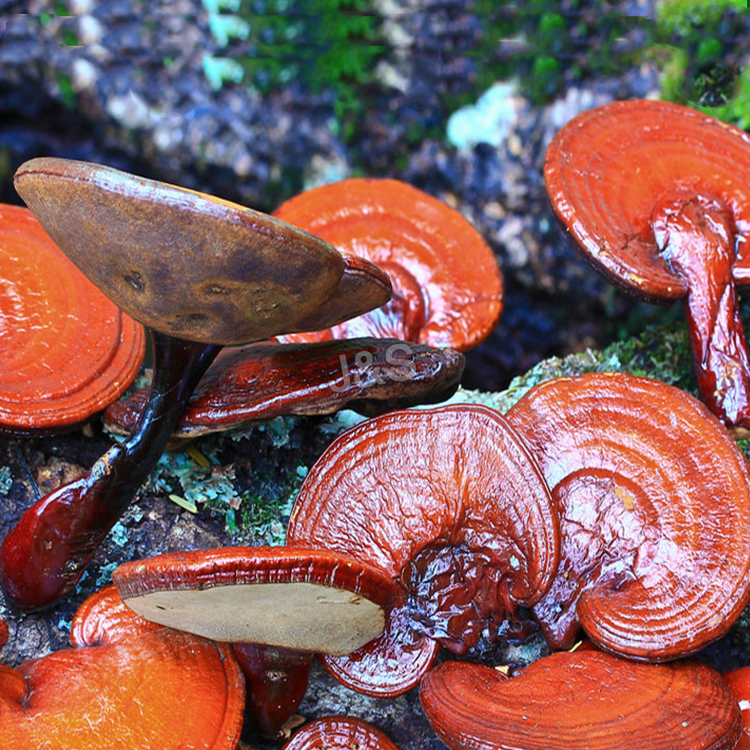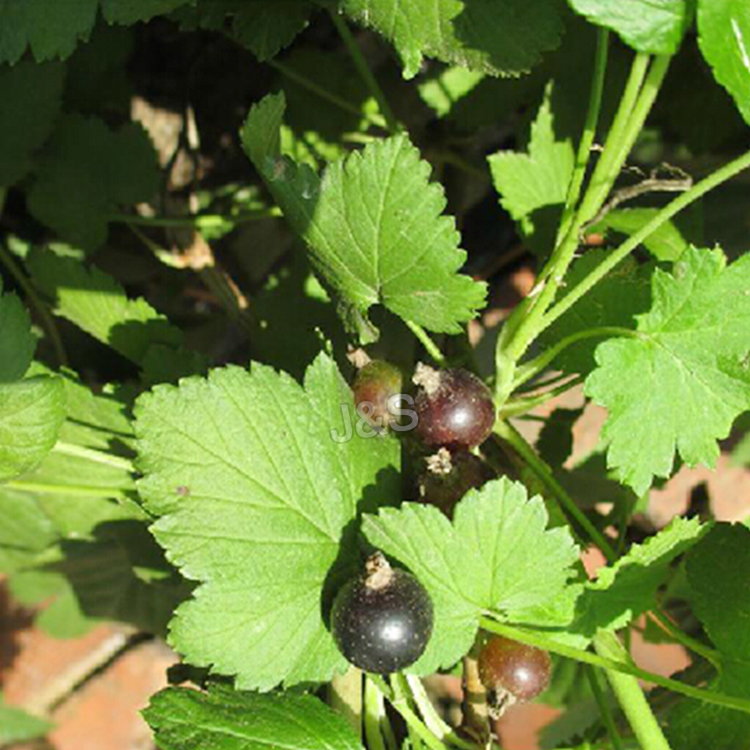High Quality Epimedium Extract Factory for Paris
High Quality Epimedium Extract Factory for Paris Detail:
[Latin Name] Epimedium sagittatnm Maxim
[Plant Source] Leaf
[Specification] Icariin 10% 20% 40% 50%
[Appearance] Light yellow fine powder
Plant Part Used: Leaf
[Particle size]80Mesh
[Loss on drying] ≤5.0%
[Heavy Metal] ≤10PPM
[Pesticide residue] EC396-2005, USP 34, EP 8.0, FDA
[Storage] Store in cool & dry area, keep away from the direct light and heat.
[Shelf life] 24 Months
[Package] Packed in paper-drums and two plastic-bags inside.
[Net weight] 25kgs/drum
[What is Epimedium?]
Epimedium extract is a popular aphrodisiac supplement and herbal sexual performance enhancer.It has a long history of traditional use in China for the alleviation of erectile dysfunction and for improving libido and fertility.
Also known as Horny Goat Weed, this supplement supposedly got its name after a farmer noticed that his flock of goats were particularly aroused after eating flowers of a specific type. These Epimedium flowers contain icariin, which is a natural compound that increases blood flow to sexual organs and promotes sex drive. Icariin has been found to increase Nitric Oxide synthesis as well as inhibiting the activity of the PDE-5 enzyme
[Icariin in Epimedium Extract]
Epimedium extracts powder contain an active phytochemical called icariin.Icariin has been observed to exhibit a number of useful traits, including renoprotective (liver protecting) hepatoprotective (kidney protecting), cardioprotective (heart protecting) and neuroprotective (brain protecting) effects.
It is also an antioxidant and can cause vasodilation. It exhibits antimicrobial characteristics and is thought to act as an aphrodisiac.
Icariin is classified as a flavonol glycoside, which is a type of flavonoid. Specifically, icariin is the 8-prenyl derivation of kaempferol 3,7-O-diglucoside, a prevalent and important flavonoid.
[Function]
1. Combat mental and physical fatigue;
2. Induce vasodilation and improve circulation;
3. Lower blood pressure in hypertensive patients;
4. Improve symptoms of erectile dysfunction (ED) through its action as a PDE5 inhibitor;
5. Improve the use of free testosterone in the blood;
6. Increase libido;
7. Alleviate symptoms of depression and stimulate improved cognitive function;
8. Protect against neurological degeneration.
Product detail pictures:

Related Product Guide:
"Control the standard by the details, show the power by quality". Our business has strived to establish a highly efficient and stable team staff and explored an effective good quality regulate course of action for High Quality Epimedium Extract Factory for Paris , The product will supply to all over the world, such as: Birmingham, Nepal, Myanmar, Our company offers the full range from pre-sales to after-sales service, from product development to audit the use of maintenance, based on strong technical strength, superior product performance, reasonable prices and perfect service, we'll continue to develop, to supply the high-quality goods and services, and promote lasting cooperation with our customers, common development and create a better future.
Stevia grows best in upland areas in sub-tropical climate. In other places it can be grown as an annual. The plant prefers a lightly textured, well-drained soil to which organic matter has been added. It needs ample water so that the soil is consistently moist, but not wet. In hot, sunny climates it will do best in semi-shade. Propagation is from seed sown in spring, but germination rates can be low-expect half the seeds sown not to germinate. Plant seedlings out once all danger of frost is over. Leaves are best harvested just before flowering. The plants will also grow from cuttings,which are best taken in late winter.The concentration of stevioside in the leaves of Stevia increasing when the plants are grown under long day condition.While, cultivating stevia on a large scale, it can be grown in well-drained red soil and sandy loam soil. The soil should be in the pH range of 6.5-7.5. Saline soils should be avoided to cultivate this plant.
Stevia can be successfully cultivated all around the year all over India expect theareas, which receive snowfall, or temperatures go below 5 degree Celsius in winter.The summer temperatures actually do not affect this plant if the high summer temperatures have already been factored in the cultivation practices.Since seed germination rate is very poor,it is propagated vegetative. Though stem cuttings are used for vegetative tissue culture plants have proven to be the best planting material for Stevia. Tissue culture plants of Stevia are genetically pure, free from pathogens and haveexcellent vigor. The tissue culture plants can be planted throughout the year,expect during peak summer. An ideal planting density is 40,000 plants per acre with spacing of 25×40 cm in a raised bed system. The soil can be enriched with abasal dressing of 25 tons of well rotten farmyard manure/hectare
Soil Type
Stevia requires very good drainage any soil that retain the moisture for very long period of time are unsuitable for Stevia cultivation and should be religiously avoided.Red soil and sandy loam with a 6-7 pH are best for the cultivation of Stevia.
Raised bed preparation
Forming raised beds is the most economical way to grow Stevia. The raised bed should be of 15 cm in height and 60 cm in width. The distance between each plant 23 cm. This would give a plant population of around 40,000 per acre.
Planting Material
There are basically two options for multiplication. The first is the tissue culture and second the stem cutting. Tissue culture is the best option but many farmers are tempted to try the stem cutting method for multiplication. As per practical experience, stem cutting is sometimes more expensive to produce than the tissue culture since the success rate of the stem cuttings establishment is very low, it takes minimum of 25 weeks for the stem cutting to develop in proper feeding roots for transplantation (younger stem cuttings transplants have shown more than 50% mortality in first few weeks of transplants in main field).
Harvesting
Another important aspect of harvesting is the timing of harvest. It should be noted that at no point of time plants should be allowed to flower since after flowering the Stevioside percentage goes down rapidly and leaves are rendered unmarketable. Leaves are harvested by plucking in a small quantity, or the entire plant with the side branches is cut leaving 10 to 15 cm from the base.The first harvesting can be done four to five months after planting. Subsequent harvesting can be done every three months, for five consecutive years. The sweetener in the leaf is maximum till the plant flowers. Just before flowering, the plant should be cut completely leaving 10 cm from the ground. The new flush of leaves will sprout from here. The new plant will be ready for harvest again in three months. The plant yields around 3000 kg of dried leaves from an acre of plantation every year. Harvesting should be done as late as possible, since cool autumn temperatures and shorter days tend to intensify the sweetness of the plants as they evolve into a reproductive state.
Unlocking the sweetness in your harvest
Once all leaves have been harvested it’s required to dry them. This can be
accomplished on a net. The drying process is not one that requires excessive heat;more important is good air circulation. On a moderately warm fall day, stevia crop can be quick dried in the full sun in about 12 hours. (Drying times longer than that will lower the stevioside content of the final product.)
Crushing the dried leaves is the final step in releasing stevia’s sweetening power. The
dried leaves are powdered, sieved and the fine powder is stored in containers. This can be done either by hand or, for greater effect, in a coffee grinder or in a special blender for herbs.
Web: https://www.natureherbs.org | www.natureherbs.co
Email : natureherbs@ymail.com
Watsapp: +91 841 888 5555
Skype: nature.herbs
Staff is skilled, well-equipped, process is specification, products meet the requirements and delivery is guaranteed, a best partner!







